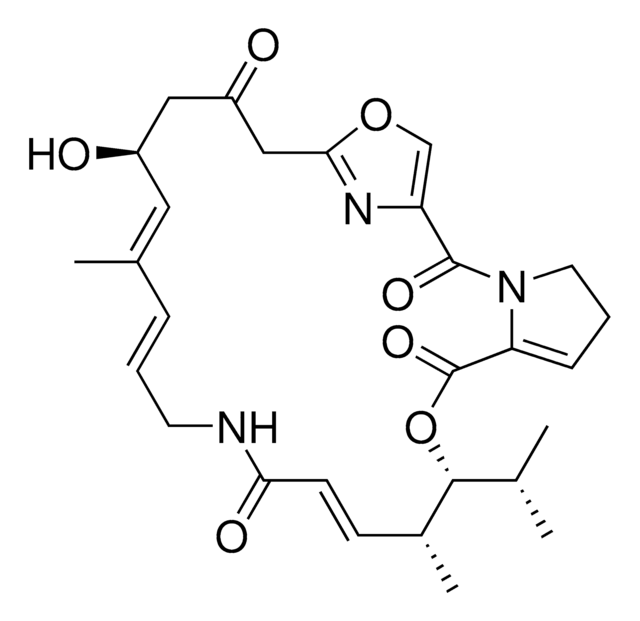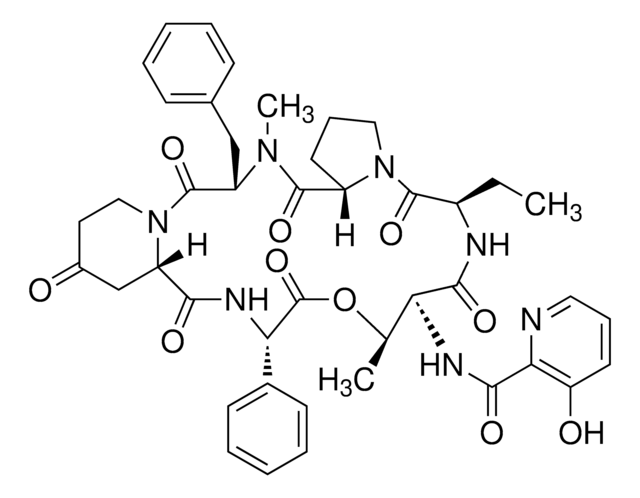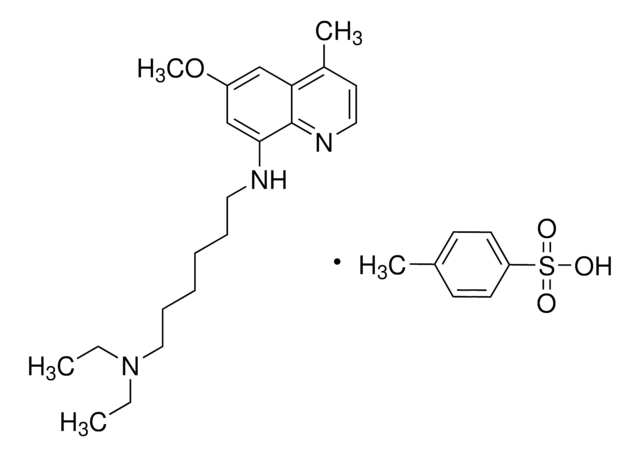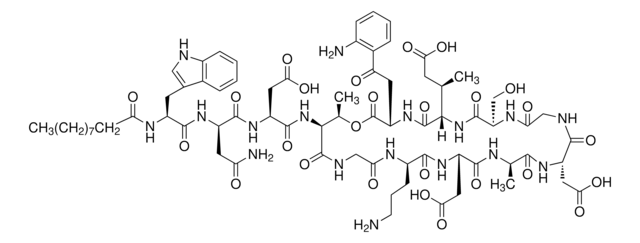SBR00044
Pristinamycin
≥98% (Assay)
Synonym(s):
Pristinamycine
About This Item
Recommended Products
Quality Level
Assay
≥98% (Assay)
form
powder
color
white to faint yellow
antibiotic activity spectrum
Gram-positive bacteria
Mode of action
protein synthesis | inhibits
storage temp.
2-8°C
SMILES string
CN(C)C1=CC=C(C[C@@H](C(N2CCC(C[C@H]2C(N[C@@H](C3=CC=CC=C3)C(O[C@H](C)[C@H](NC(C4=NC=CC=C4O)=O)C5=O)=O)=O)=O)=O)N(C)C([C@H]6N(C([C@@H](N5)CC)=O)CCC6)=O)C=C1.O=C(N7C(C(O[C@H](C(C)C)[C@H](C)/C=C/C(NC/C=C/C(C)=C/[C@@H](O)CC(C8)=O)=O)=O)=CCC7)C9=COC8=N9
InChI
1S/C45H54N8O10.C28H35N3O7/c1-6-31-42(59)52-22-11-14-32(52)43(60)51(5)34(24-27-16-18-29(19-17-27)50(3)4)44(61)53-23-20-30(54)25-33(53)39(56)49-37(28-12-8-7-9-13-28)45(62)63-26(2)36(40(57)47-31)48-41(58)38-35(55)15-10-21-46-38;1-17(2)26-19(4)9-10-24(34)29-1
InChI key
YVMBAUWDIGJRNY-OOVQIFRISA-N
General description
Application
- in cloning and sequencing of genes involved in the biosynthesis of the depsipeptide antibiotics pristinamycins I (PI) produced by Streptomyces pristinaespiralis
- in a study on inducible gene expression system in mycobacteria
Biochem/physiol Actions
- Inhibition of protein synthesis: Pristinamycin binds to the 50S ribosomal subunit in bacterial cells, thereby inhibiting the formation of peptide bonds during protein synthesis. This disrupts the translation process and prevents the production of essential proteins necessary for bacterial growth and survival.
- Interference with cell wall synthesis: Pristinamycin also interferes with the synthesis of bacterial cell walls. It inhibits the transpeptidation step of peptidoglycan biosynthesis, which is essential for the cross-linking of cell wall components. This leads to the weakening of the bacterial cell wall and eventual cell lysis
Activity spectrum: Pristinamycin shows anti-bacterial activity against Gram-positive bacteria like Staphylococcus spp. and Streptococcus spp. Pristinamycin displays antimicrobial activity against macrolide-resistant Mycoplasma genitalium infection.
Features and Benefits
- Broad-spectrum activity: Pristinamycin is effective against a wide range of bacteria, including both Gram-positive and Gram-negative bacteria, as well as resistant strains.
- Synergistic effect: The two components of pristinamycin work together to produce a synergistic effect, meaning that they are more effective together than they are individually.
- Versatility: Pristinamycin can be used in Cell Biology and Biochemical applications
Other Notes
Storage Class Code
11 - Combustible Solids
WGK
WGK 3
Flash Point(F)
Not applicable
Flash Point(C)
Not applicable
Choose from one of the most recent versions:
Certificates of Analysis (COA)
It looks like we've run into a problem, but you can still download Certificates of Analysis from our Documents section.
If you need assistance, please contact Customer Support.
Already Own This Product?
Find documentation for the products that you have recently purchased in the Document Library.
Our team of scientists has experience in all areas of research including Life Science, Material Science, Chemical Synthesis, Chromatography, Analytical and many others.
Contact Technical Service







